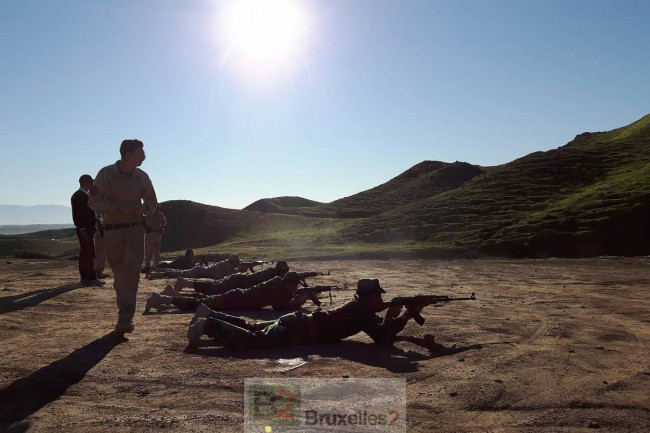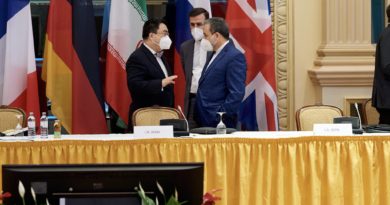The mutual assistance clause triggered by France: assessment one month later (survey)

(B2 - exclusive) A month ago, Jean-Yves Le Drian, the French Defense Minister, arrived at the Council of Ministers of the European Union with a very simple message, summed up in a few words: I demand invocation of the clause of article 42.7. A clause, sometimes called the solidarity clause, more often the mutual assistance or defense clause, which even European specialists had somewhat forgotten about (read: Can France trigger a solidarity clause from its allies? What interest ?).
B2 investigated the implementation of this clause. All the details were published a few days ago in our professional edition, article updated several times, lastly today (Read also: The mutual assistance clause activated. Who is mobilizing? How? 'Or' What ? Survey (upd3)). After a month, we can draw a first assessment and give some additional explanations.
A mixed record so far
First of all, we perceive a basic trend. The political support is full among the 28. And the real awareness. But, beyond the words, the actual commitment is very diverse. Then, it is often difficult to identify what really corresponds to a new commitment - responding to the mutual assistance clause -, and what just corresponds to the recycling of a decision already taken or the " reorientation » of a mission already committed or already decided. There is often a mixture of the two, in a confusion skillfully maintained by many governments, for both internal and external reasons. Finally, it is very often a first draft. Several countries have indicated that they intend to explore the subject further and make other proposals next year. For some countries, redeploying funding for men and funding (already planned and endorsed in the mandates voted by their assemblies) is not always easy
Three allies quickly engaged
The effective commitment was made in a major way by three allies: Germany, Belgium, United Kingdom. Each for different (good) internal reasons.
In London, French demand provided an excellent window of opportunity for David Cameron. The Prime Minister who suffered a notable failure in the House of Commons in August 2013 is thus back in the 'race' and, above all, finds a role in the international coalition led by the Americans. The United Kingdom was, in fact, marginalized; the place of “faithful” ally having been conquered by France. Internally, it also enabled him to drive a wedge into the labor camp.
In Berlin, the German commitment, proposed by Defense Minister Ursula von der Leyen, was arbitrated at the highest level by Angela Merkel, and fast. This is particularly noteworthy and marks the German determination to be at France's side (as well as to find a place as a sure ally in the international coalition, motivation similar to the British on this point). Admittedly, it remains in logistical support, but this support is very useful and well targeted (air surveillance, satellite, in-flight refuellers, maritime, etc.), not to mention what is not said (the commitment of German intelligence, the BND, particularly active in the area). Its cost (134 million euros for one year) testifies to the value of the commitment. A decision made in a few days. This proves that we can combine responsiveness and democratic consultation when there is political will and a favorable context.
The Belgian commitment should also be noted. Admittedly, this is partly a reorientation of the mission of Leopold I more than a new commitment, but it is accompanied by a reserve from 2016 of significant new resources for a 'small' country (approximately 300 men for an operation in the Sahel). For a more mid-sized country, this is a significant commitment,
Small but useful contributions
A good dozen other countries proceeded fairly quickly to decision-making, each according to its internal constraints and possibilities. Some have proposed flight hours for C17-type strategic transport aircraft or Antonov An124 jumbo jets (Sweden, Luxembourg, Finland).
Others (Bulgaria, Estonia, Latvia, Lithuania, Luxembourg, Romania, Slovakia, Slovenia and the Czech Republic) have announced a small reinforcement of additional personnel in the two missions deployed in Mali - the European mission EUTM Mali for the training of the Malian army and MINUSMA blue helmets. For UNIFIL in Lebanon, France will be able to count on Finland, which should release a large number of troops.
Few countries have committed themselves to the mission in the Central African Republic, EUMAM RCA, which does not arouse much enthusiasm (Romania, Sweden). Croatia offered ammunition.
These commitments often seem quite limited. But added to each other, they form a whole which is not negligible. Taken together, there are about thirty more personnel for EUTM Mali and 4 personnel for EUMAM RCA, as well as 120 hours of strategic flights.
NB: we do not mention Denmark because the commitment in the MINUSMA was already committed and decided at the time of the invocation of the solidarity clause (the vote in Parliament took place on November 17). It certainly contributes to the same objective: the stabilization of Mali. But we can't talk about additional staff or resources as some mention...
Those who have offered nothing
A dozen countries have not, for the moment, provided any official response to the French request. Among them, there are four 'medium' powers with a large army corps (Spain, Italy, the Netherlands, Poland) which could therefore provide resources.
Some have 'good' reasons. Spain is in an election period. Italy wants to keep a focus on the Mediterranean, Somalia and Libya. The Netherlands, already engaged in Mali (in MINUSMA) and the Middle East, is closely examining the option of further engagement by extending its F-16 mission over Iraq towards Syria (for The Hague, it is more a matter of time). For others like Poland, it is more confusing, just like Hungary, which did not answer precisely.
Ireland showed goodwill but failed to materialize, as did Austria. Other countries (Greece, Portugal) have serious economic difficulties and real difficulties in getting involved or do not really have the means (Cyprus, Malta).
Comment: Here we find the big problem of European defence. On the one hand, there is no overall planning of external commitments. Everyone does what they want, according to their convictions, the opportunities that arise, without really having a strategy. Basically it's a gigantic mess ... and often a lot of financial and operational waste. On the other hand, the countries having at the same time real military capacities (those available and not those appearing on the booklets of General Staff), financial possibilities and political wills, can be counted on the fingers of one hand (and half). The others are like stowaways. They can provide some personnel (no more than 5 in general), for additional operations, but already engaged in other NATO or UN operations (if at all), cannot release additional means . They benefit from global security, without really committing...
(Nicolas Gros-Verheyde)
(maj) article updated Fri 18.12 and Sat 19.12 (Finland, Czech Rep.)



